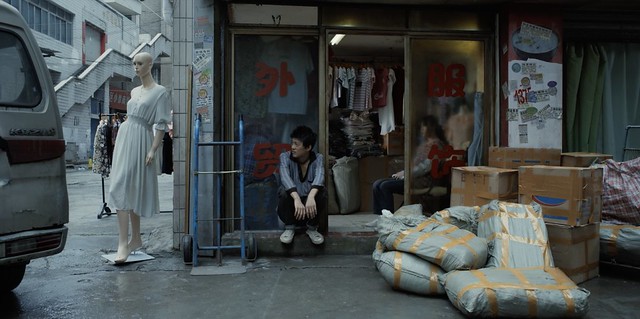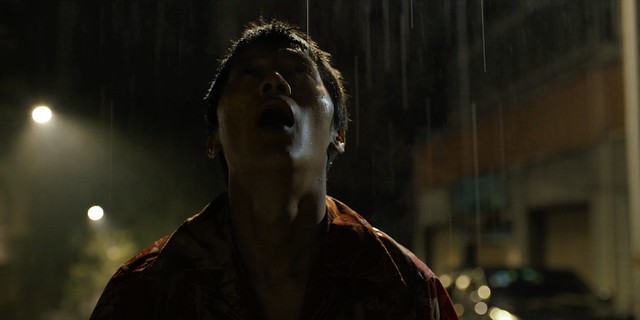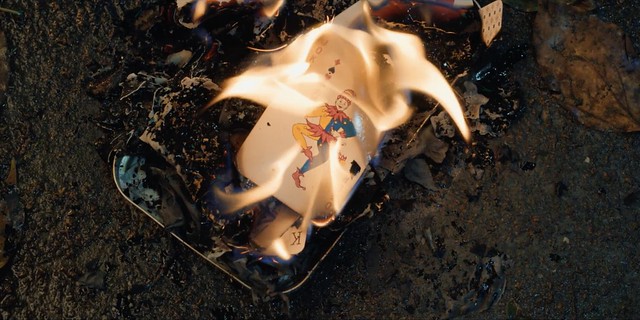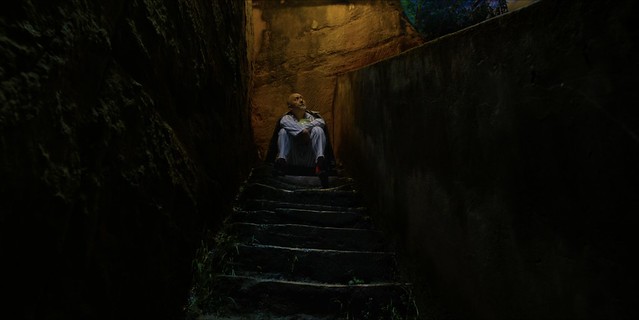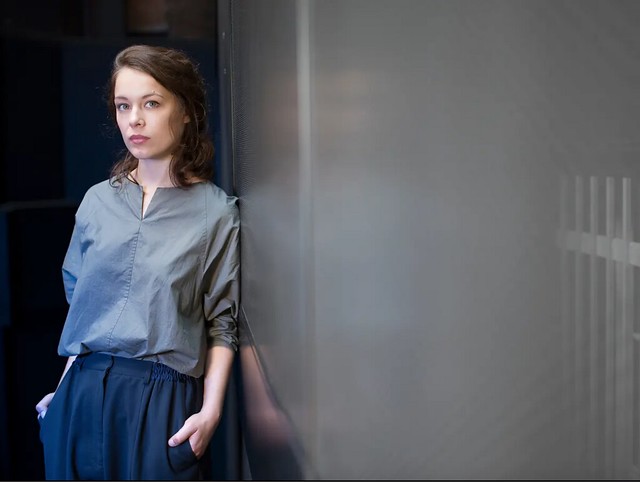Leading this year’s guests, JAPAN CUTS has the honor of presenting acclaimed actor Yuya Yagira with the 2023 CUT ABOVE Award for Outstanding Achievement in Film for his role in Under The Turquoise Sky by director KENTARO.
Here are some unique and outstanding films I was able to preview:
The First Slam Dunk - Inoue
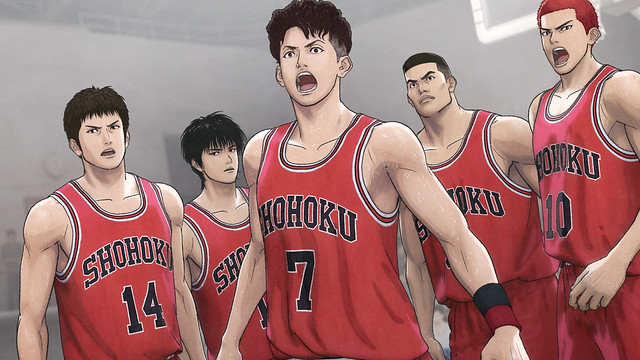 The wildly popular manga-turned-TV anime series Slam Dunk creator Inoue Takehiko finally comes up with The First Slam Dunk, a feature length anime about a high stakes final game in high school basketball tournament and its players. Using both 3DCG and 2D animation, Inoue creates tense, poignant sports film that is thoroughly enjoyable. It starts with Miyagi Ryota, a short kid from Okinawa who loses his mentor brother and becoming a point guard for the Shohoku high school team against unbeatable reigning champs, the Sannoh. Inoue wastes no time and throws us into the final game as the ragtag underdogs beating against all odds and turning the apathetic spectators around their sides with their tenacity and sheer will power. Other than Miyagi, there is the team's power forward loose cannon Sakuragi (the red head main protagonist in Slam Dunk manga series), Hisashi, shooting guard, Rukawa, small forward, and Akagi, the long-suffering captain and center. Each gets his own limelight and backstory. But it's the game itself that is exciting to watch - at one point down 20 points, the Shohoku team seems helpless and in the midpoint of the film. Then it catches fire as it plays out with some crazy play by play as their scores seesaw back and forth - the time elongates as the tension builds to the final moment of the game. And what a beautiful game it is! The First Slam Dunk is much less juvenile than its origins. It's not about playing basketball to be cool or get girls. Girls are on the sidelines. It's all about the game and it's exciting.
The wildly popular manga-turned-TV anime series Slam Dunk creator Inoue Takehiko finally comes up with The First Slam Dunk, a feature length anime about a high stakes final game in high school basketball tournament and its players. Using both 3DCG and 2D animation, Inoue creates tense, poignant sports film that is thoroughly enjoyable. It starts with Miyagi Ryota, a short kid from Okinawa who loses his mentor brother and becoming a point guard for the Shohoku high school team against unbeatable reigning champs, the Sannoh. Inoue wastes no time and throws us into the final game as the ragtag underdogs beating against all odds and turning the apathetic spectators around their sides with their tenacity and sheer will power. Other than Miyagi, there is the team's power forward loose cannon Sakuragi (the red head main protagonist in Slam Dunk manga series), Hisashi, shooting guard, Rukawa, small forward, and Akagi, the long-suffering captain and center. Each gets his own limelight and backstory. But it's the game itself that is exciting to watch - at one point down 20 points, the Shohoku team seems helpless and in the midpoint of the film. Then it catches fire as it plays out with some crazy play by play as their scores seesaw back and forth - the time elongates as the tension builds to the final moment of the game. And what a beautiful game it is! The First Slam Dunk is much less juvenile than its origins. It's not about playing basketball to be cool or get girls. Girls are on the sidelines. It's all about the game and it's exciting.
Under the Turquoise Sky - Kentaro
 Amraa, a Mongolian horse thief is first seen stealing a horse from a stable and riding through Tokyo city scape. He is soon apprehended by authorities. It turns out the horse belongs to an aging business tycoon Saburo. In turn, Saburo makes a deal with the Mongolian: take his spoiled, womanizing grandson Takeshi (Yagira Yuya, the youngest recipient of top acting winner at Cannes for Kore-eda's Nobody Knows in 2004) to Mongolia and find his long-lost daughter that he sired with a Mongolian woman when he was stationed there in WW2. So begins an unlikely journey Under the Turquoise Sky, driving through the breathtaking steppe landscape of Mongolia. Without much dialog, director Kentaro paints the picture with broad strokes, peppered with magic realism and visual poetry. This leisurely paced, Jarmusch-ite road trip movie has its charm.
Amraa, a Mongolian horse thief is first seen stealing a horse from a stable and riding through Tokyo city scape. He is soon apprehended by authorities. It turns out the horse belongs to an aging business tycoon Saburo. In turn, Saburo makes a deal with the Mongolian: take his spoiled, womanizing grandson Takeshi (Yagira Yuya, the youngest recipient of top acting winner at Cannes for Kore-eda's Nobody Knows in 2004) to Mongolia and find his long-lost daughter that he sired with a Mongolian woman when he was stationed there in WW2. So begins an unlikely journey Under the Turquoise Sky, driving through the breathtaking steppe landscape of Mongolia. Without much dialog, director Kentaro paints the picture with broad strokes, peppered with magic realism and visual poetry. This leisurely paced, Jarmusch-ite road trip movie has its charm.
Amraa, a Mongolian horse thief is first seen stealing a horse from a stable and riding through Tokyo city scape. He is soon apprehended by authorities. It turns out the horse belongs to an aging business tycoon Saburo. In turn, Saburo makes a deal with the Mongolian: take his spoiled, womanizing grandson Takeshi (Yagira Yuya, the youngest recipient of top acting winner at Cannes for Kore-eda's Nobody Knows in 2004) to Mongolia and find his long-lost daughter that he sired with a Mongolian woman when he was stationed there in WW2. So begins an unlikely journey Under the Turquoise Sky, driving through the breathtaking steppe landscape of Mongolia. Without much dialog, director Kentaro paints the picture with broad strokes, peppered with magic realism and visual poetry. This leisurely paced, Jarmusch-ite road trip movie has its charm.
Amraa, a Mongolian horse thief is first seen stealing a horse from a stable and riding through Tokyo city scape. He is soon apprehended by authorities. It turns out the horse belongs to an aging business tycoon Saburo. In turn, Saburo makes a deal with the Mongolian: take his spoiled, womanizing grandson Takeshi (Yagira Yuya, the youngest recipient of top acting winner at Cannes for Kore-eda's Nobody Knows in 2004) to Mongolia and find his long-lost daughter that he sired with a Mongolian woman when he was stationed there in WW2. So begins an unlikely journey Under the Turquoise Sky, driving through the breathtaking steppe landscape of Mongolia. Without much dialog, director Kentaro paints the picture with broad strokes, peppered with magic realism and visual poetry. This leisurely paced, Jarmusch-ite road trip movie has its charm.
From the End of the World - Kiriya
 Kiriya Kazuaki (Casshern, The Last Knights) directs a low budget time traveling tale where a high school girl's recurring dreams of marauding samurais in medieval Japan may hold a key to survival of mankind from apocalypse. After her grandmother's death, 17-year-old lonely high school girl Hana (Ito Aoi), is giving up on her dream of being cosmetologist, to support herself by working at a bar. She is soon visited by a secret government official who seem to be very interested in what she's dreaming. It turns out the world is ending in two weeks and only her dreams can alter the outcome of the book which contains the humanity's fate. Navigating between reality and dreams, Hana must save Yuki, a little girl in her dream, from a menacing, time traveling samurai (Kitamura Kazuki, letting his eyebrow to do the talking as usual). The convoluted script resembles typical 'end of the world' manga premises, From the End of the World depends too much on lengthy explanation, but Kiriya's energetic DIY style (DP, Kanbe Chigi) camera movement and digitized color palette make an enjoyable two-hour ride.
Kiriya Kazuaki (Casshern, The Last Knights) directs a low budget time traveling tale where a high school girl's recurring dreams of marauding samurais in medieval Japan may hold a key to survival of mankind from apocalypse. After her grandmother's death, 17-year-old lonely high school girl Hana (Ito Aoi), is giving up on her dream of being cosmetologist, to support herself by working at a bar. She is soon visited by a secret government official who seem to be very interested in what she's dreaming. It turns out the world is ending in two weeks and only her dreams can alter the outcome of the book which contains the humanity's fate. Navigating between reality and dreams, Hana must save Yuki, a little girl in her dream, from a menacing, time traveling samurai (Kitamura Kazuki, letting his eyebrow to do the talking as usual). The convoluted script resembles typical 'end of the world' manga premises, From the End of the World depends too much on lengthy explanation, but Kiriya's energetic DIY style (DP, Kanbe Chigi) camera movement and digitized color palette make an enjoyable two-hour ride.
Amiko - Morii
 A remarkable directorial debut of Morii Yusuke, based on a book Kochira Amiko (Look Here Amiko) by Imamura Natsuko, Amiko tells an oddball grade schooler (Osawa Kana) living in a small seaside town. She lives with her parents and her older brother. She has tendency to obsess over small things around her life - a big mole on her mom's chin, a neighborhood boy named Nori who's in the same class, various animals and insects that share her immediate, rural environment. She is an enthusiastic, high-energy child with wild imaginations. But she is sometimes too much for everyone around her. Unbeknownst to Amiko, life takes a darker turn as her mom's miscarriage reverberates throughout her family - mom's postpartum depression takes a toll on her mental health, her father is more absent-minded, and her brother becomes a raging juvenile delinquent.
A remarkable directorial debut of Morii Yusuke, based on a book Kochira Amiko (Look Here Amiko) by Imamura Natsuko, Amiko tells an oddball grade schooler (Osawa Kana) living in a small seaside town. She lives with her parents and her older brother. She has tendency to obsess over small things around her life - a big mole on her mom's chin, a neighborhood boy named Nori who's in the same class, various animals and insects that share her immediate, rural environment. She is an enthusiastic, high-energy child with wild imaginations. But she is sometimes too much for everyone around her. Unbeknownst to Amiko, life takes a darker turn as her mom's miscarriage reverberates throughout her family - mom's postpartum depression takes a toll on her mental health, her father is more absent-minded, and her brother becomes a raging juvenile delinquent.
Young Kana's wide-eyed wild child is a revelation, embodying Amiko who doesn't understand the consequence of her actions and tragedies that befall in life, obviously, because she is just a child. Morii captures all this in constant close-up of Kana's round, adorable face. It's a remarkable, heartbreaking unusual film about growing up.
Hand - Matsui
 Hand - Matsui
Sawako (Fukunaga Akari), a twenty-something office worker has a fetish for old men. She collects photos of old men taken on the street in a series of scrap books named "Happy Old Men," like schoolgirls collects pictures of cute animals. She thinks the snapshots of their content-with-life expressions and their bald spots and portly figures adorable. She gets a lot of attention from older men as well, but she observes that they tend to treat her like a little girl when they are alone. At home, her father prefers to interact with mom and her younger sister who's still in high school. It seems that her father doesn't quite know how to behave around his grown up daughter. Sawako starts an intense physical relationship with a former co-worker Koichi whom she confesses her love. But it turns out that he is in another relationship. Unwanted at home, and heartbroken with her lover, Sawako reassesses her adulthood.
Conceived as a Roman Porno revival project by Nikkatsu Studio, Matsui Daigo (Japanese Girls Never Die) directs Hand. Yes, it abides by the Roman Porno rules (low budget, shot in a week with sex scene every 10 minutes). But the film is an exceptionally well written poignant, intimate relationship drama that gently approaches father-daughter relationship. Hand is a great little film which shows you that the spirit of Japanese indie film scene is alive and well.
Hand - Matsui
Sawako (Fukunaga Akari), a twenty-something office worker has a fetish for old men. She collects photos of old men taken on the street in a series of scrap books named "Happy Old Men," like schoolgirls collects pictures of cute animals. She thinks the snapshots of their content-with-life expressions and their bald spots and portly figures adorable. She gets a lot of attention from older men as well, but she observes that they tend to treat her like a little girl when they are alone. At home, her father prefers to interact with mom and her younger sister who's still in high school. It seems that her father doesn't quite know how to behave around his grown up daughter. Sawako starts an intense physical relationship with a former co-worker Koichi whom she confesses her love. But it turns out that he is in another relationship. Unwanted at home, and heartbroken with her lover, Sawako reassesses her adulthood.
Conceived as a Roman Porno revival project by Nikkatsu Studio, Matsui Daigo (Japanese Girls Never Die) directs Hand. Yes, it abides by the Roman Porno rules (low budget, shot in a week with sex scene every 10 minutes). But the film is an exceptionally well written poignant, intimate relationship drama that gently approaches father-daughter relationship. Hand is a great little film which shows you that the spirit of Japanese indie film scene is alive and well.


